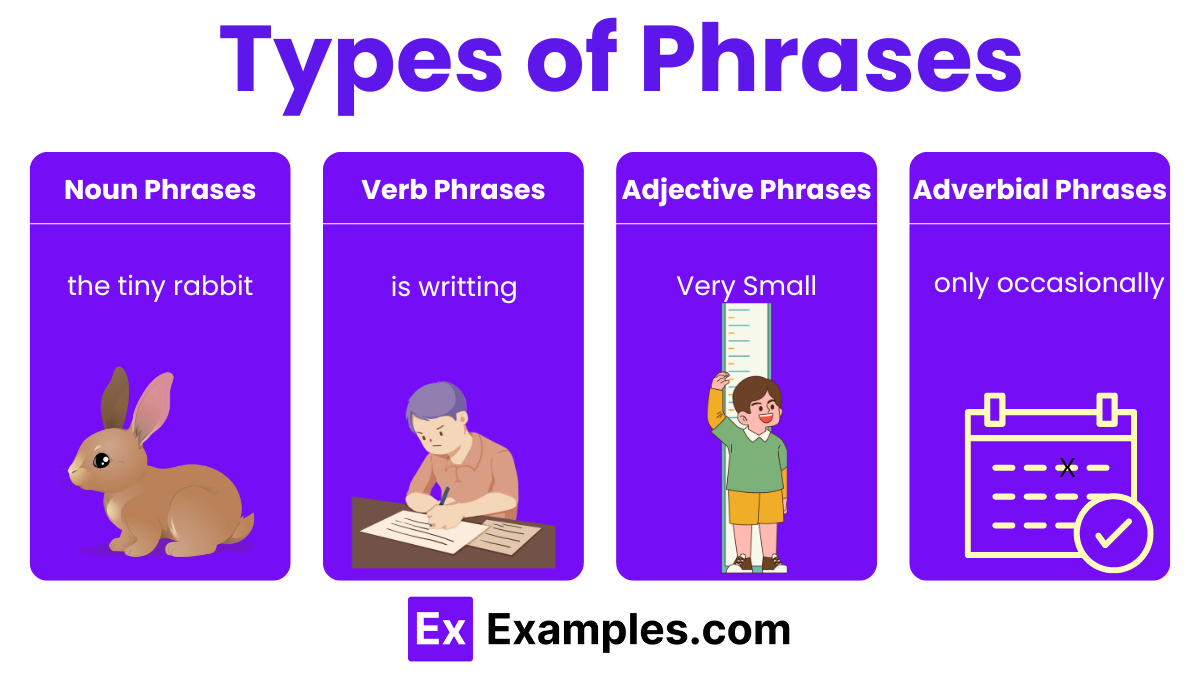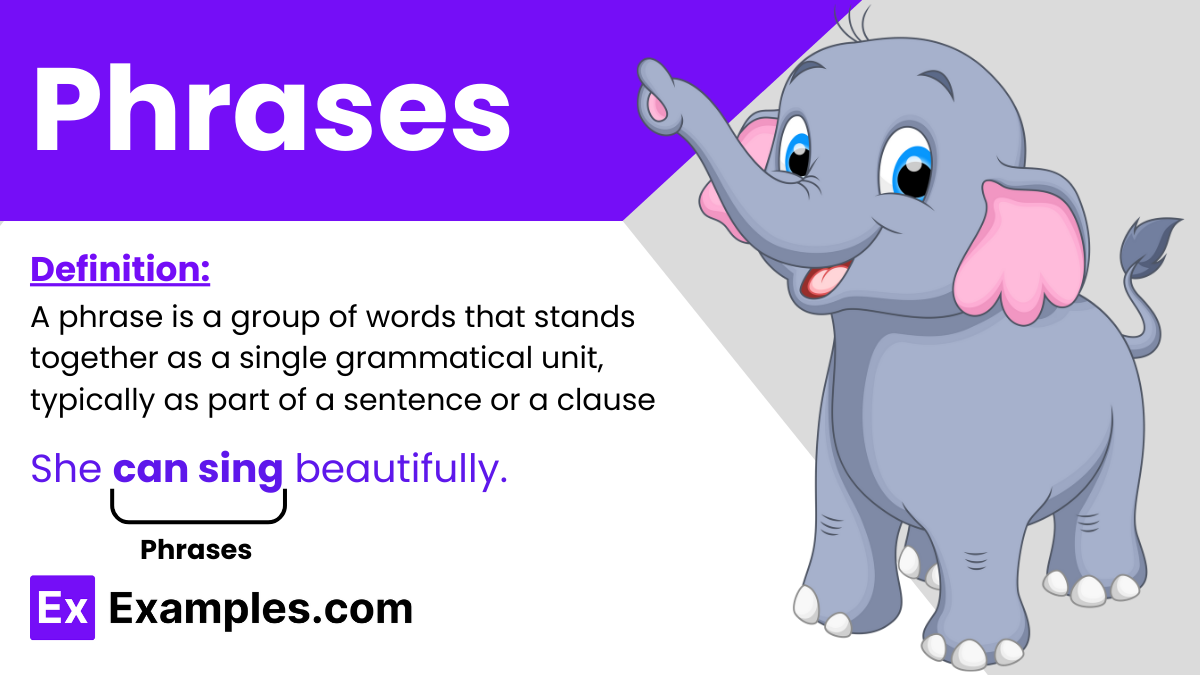50+ Phrase Examples
Phrases are the building blocks of sentences, enriching text with depth and complexity. Understanding how to use them effectively can dramatically improve your writing, whether for academic purposes, communication in real Life, or creative expression.
What is Phrases?
A phrase is a group of words that stands together as a single grammatical unit, typically as part of a sentence or a clause. Unlike a complete sentence, a phrase does not contain a subject and a verb and therefore cannot convey a complete thought by itself.
Types of Phrases
Different types of phrases in English grammar is essential for constructing clear and effective sentences. Here’s a breakdown of the main types of phrases and their function.

1. Noun Phrases (NP)
A noun phrase includes a noun—the main word—and the modifiers that distinguish it. These modifiers can include adjectives, articles, and pronouns. Noun phrases can act as subjects, objects, or complements in a sentence.
- Example: “The cheerful little girl” waved at us.
2. Verb Phrases (VP)
A verb phrase consists of a main verb along with its helping (auxiliary) verbs. Verb phrases express actions or states of being.
- Example: She “has been preparing” dinner for two hours.
3. Adjective Phrases
An adjective phrase modifies a noun or pronoun by describing it, usually consisting of an adjective and its modifiers.
- Example: He is “extremely knowledgeable” about European history.
4. Adverbial Phrases
Adverbial phrases modify verbs, adjectives, or other adverbs. They typically tell when, where, how, and to what extent an action is performed.
- Example: She sings “with great emotion.”
5. Prepositional Phrases (PP)
Prepositional phrases start with a preposition and end with a noun or pronoun, known as the object of the preposition. They can function as adjectives or adverbs, providing additional details about time, location, or relationship.
- Example: He sat “on the old wooden bench.”
6. Infinitive Phrases
An infinitive phrase includes the infinitive form of a verb (to + verb) and any modifiers or complements associated with it. Infinitive phrases can function as nouns, adjectives, or adverbs.
- Example: “To win the championship” is his ultimate goal.
7. Gerund Phrases
Gerund phrases consist of a gerund (a verb ending in -ing that serves as a noun) and any modifiers or objects related to it.
- Example: “Swimming in the ocean” has always terrified her.
8. Participial Phrases
Participial phrases include a present or past participle and any modifiers. These phrases usually act as adjectives, providing further information about a noun or pronoun.
- Example: “Running toward the finish line,” the athlete collapsed in joy.
Utilizing phrases effectively in sentences is essential for crafting clear, engaging, and nuanced writing. Phrases add detail and complexity, enhancing the reader’s understanding and interest. Here’s a guide on integrating various types of phrases into your sentences.
How to Use Phrases in a Sentence
Noun Phrases Examples
- A bouquet of vibrant flowers brightened the room.
- She adopted a cat with white fur.
Verb Phrases Examples
- They have been preparing for the exam all week.
- She can sing beautifully.
Adjective Phrases Examples
- The runner, tired from the long race, collapsed at the finish line.
- We entered a room full of busy people.
Adverbial Phrases Examples
- She spoke with great enthusiasm.
- Due to the storm, the event was postponed.
Prepositional Phrases Examples::
- He sat on the old wooden bench.
- Before the show, we had dinner.
Tips for Using Phrases in Sentences:
- Enhance clarity and detail: Use phrases to provide specific details that clarify or add depth to your sentences.
- Maintain balance: While phrases enhance sentences, too many can make them cumbersome. Balance detail with brevity.
- Match the context: Ensure the phrases you use are appropriate to the sentence’s context and overall message.
Importance of Phrases in English
- Building Blocks of Sentences
- Phrases are the core components that form sentences. Without phrases, sentences would lack detail and structure, making communication less effective.
- Enhancing Meaning and Clarity
- Phrases add precision and clarity to sentences by providing essential information about the action, location, time, and manner.
- Adding Descriptive Detail
- Through adjective and adverbial phrases, English allows speakers and writers to describe concepts and actions in vivid detail, enhancing imagery and understanding.
- Expressing Complex Ideas
- Phrases enable the expression of complex ideas by allowing the inclusion of additional information without the need for multiple sentences, thus keeping communication concise yet comprehensive.
- Flexibility in Expression
- The use of different types of phrases (noun, verb, prepositional) gives speakers the flexibility to rearrange words and change the emphasis within sentences, tailoring their speech or writing to different contexts and audiences.
- Improving Language Fluency
- Mastery of phrases helps in developing language fluency. Understanding and using various phrase structures can significantly enhance a learner’s speaking and writing skills.
- Supporting Language Development
- Learning about phrases supports overall language development by helping individuals grasp the nuances of English syntax and grammar.
- Facilitating Effective Communication
- Effective communication often depends on the speaker’s ability to strategically use phrases to convey thoughts in an organized, clear, and engaging manner.
Phrases Function in a Sentence
- Subject
- Phrases can act as the subject of a sentence, performing the action of the verb.
- Example: “The barking dog” keeps the neighbors awake.
- Predicate
- Verb phrases constitute the predicate, expressing what the subject is doing or being.
- Example: She “is preparing for the exam.”
- Object
- Phrases can function as objects, either direct or indirect, receiving the action of the verb.
- Example: John enjoyed “a long, relaxing walk.”
- Complement
- Phrases can serve as complements, providing more information about the subject or object, often after linking verbs.
- Example: His greatest fear is “being alone.”
- Modifier
- Phrases can modify nouns (adjective phrases) or verbs (adverbial phrases), providing additional details like description, time, place, reason, or manner.
- Example (adjective phrase): The car “with the black stripes” is faster.
- Example (adverbial phrase): They danced “with great enthusiasm.”
- Appositive
- An appositive phrase renames or provides more information about a noun mentioned earlier in the sentence, adding descriptive detail or clarification.
- Example: My sister, “an experienced pilot,” will join us tomorrow.
- Prepositional
- Prepositional phrases begin with a preposition and end with a noun or pronoun, adding context such as location, direction, time, or manner.
- Example: He found his keys “under the couch.”
Fill in the Blanks
- Fill in the blank with an appropriate noun phrase: “______ is a great place to visit during the summer.”
- Answer: “The beach”
- Complete the sentence with a verb phrase: “She _____ in New York for five years now.”
- Answer: “has been living”
- Fill in the blank with a prepositional phrase: “Could you put the books ______?”
- Answer: “on the shelf”
- Insert an adjective phrase to complete the sentence: “The house, ______, is now worth double the purchase price.”
- Answer: “beautifully renovated”
- Complete the sentence with an adverbial phrase: “He completed his assignment _____ before the deadline.”
- Answer: “well ahead”
Convert to Phrase
- Convert the following sentence to a noun phrase: “The dog that barks loudly.”
- Answer: “The loudly barking dog”
- Turn the sentence into a verb phrase: “She can swim very fast.”
- Answer: “can swim very fast”
- Convert this sentence into an adjective phrase: “The flowers that are blooming in the garden are beautiful.”
- Answer: “blooming in the garden”
- Change the sentence into an adverbial phrase: “He speaks in a very loud voice.”
- Answer: “in a very loud voice”
- Transform the sentence to a prepositional phrase: “She was sitting by the old oak tree.”
- Answer: “by the old oak tree”
Find Out the Phrase in the Sentence
- Identify the noun phrase in the sentence: “The old man sat by the window.”
- Answer: “The old man”
- Find the verb phrase in this sentence: “They have been working on the project since last week.”
- Answer: “have been working”
- Locate the adjective phrase in the sentence: “The car, expensive and sleek, won the race.”
- Answer: “expensive and sleek”
- Identify the adverbial phrase in the sentence: “She sings beautifully in the choir.”
- Answer: “beautifully in the choir”
- Find the prepositional phrase in this sentence: “He found his keys under the bed.”
- Answer: “under the bed”
- Identify the infinitive phrase in the sentence: “To win the championship is his dream.”
- Answer: “To win the championship”
- Locate the gerund phrase in this sentence: “Swimming in the ocean can be dangerous.”
- Answer: “Swimming in the ocean”
- Find the participial phrase in the sentence: “Running toward the finish line, she felt a surge of excitement.”
- Answer: “Running toward the finish line”
FAQs
What is Simple Phrases?
A simple phrase is a group of two or more words that function as a single unit within a sentence but do not contain a subject and a verb. Simple phrases can act as nouns, adjectives, or adverbs, depending on their construction and usage in context.
What is a Phrase for Kids?
For kids, a phrase can be explained as a small group of words that are used together to add meaning to a sentence. Unlike sentences, phrases do not have both a subject and a verb and do not express a complete thought.
Is Two Words a Phrase?
Yes, two words can form a phrase if they function together as a unit in a sentence. Examples include “on time,” “high school,” and “very cold.” These combinations provide additional information but do not form complete sentences on their own.
What are the 4 Common Types of Phrases?
The four common types of phrases in English are noun phrases, verb phrases, adjective phrases, and adverbial phrases. Each serves a specific function in the sentence, such as acting as a subject, describing actions, or modifying other words.
Can a Single Word be a Phrase?
Typically, a single word does not constitute a phrase because phrases are defined as groups of words that work together. However, in some contexts, a single-word expression might function as a phrase if it behaves like one grammatically.


